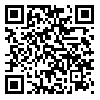Sun, Feb 1, 2026
Volume 34, Issue 2 (2-2024)
JHNM 2024, 34(2): 167-176 |
Back to browse issues page
Download citation:
BibTeX | RIS | EndNote | Medlars | ProCite | Reference Manager | RefWorks
Send citation to:



BibTeX | RIS | EndNote | Medlars | ProCite | Reference Manager | RefWorks
Send citation to:
Mousavi N, Imani B, Khazaei S, Shams A. The Effect of Benson Relaxation Technique and Lavender Aromatherapy on Anxiety and Hemodynamic Indices of Patients Undergoing Coronary Artery Bypass Grafting: A Randomized Clinical Trial. JHNM 2024; 34 (2) :167-176
URL: http://hnmj.gums.ac.ir/article-1-2314-en.html
URL: http://hnmj.gums.ac.ir/article-1-2314-en.html
1- Instructor, Department of Operating Room, School of Paramedicine, Hamadan University of Medical Sciences, Hamadan, Iran.
2- Associate Professor, Department of Operating Room, School of Paramedicine, Hamadan University of Medical Sciences, Hamadan, Iran. ,behzadiman@yahoo.com
3- Assistant Professor, Department of Epidemiology, School of Public Health, Hamadan University of Medical Sciences, Hamadan, Iran.
4- Assistant Professor, Department of Cardiac Surgery, School of Medicine, Hamadan University of Medical Sciences, Hamadan, Iran.
2- Associate Professor, Department of Operating Room, School of Paramedicine, Hamadan University of Medical Sciences, Hamadan, Iran. ,
3- Assistant Professor, Department of Epidemiology, School of Public Health, Hamadan University of Medical Sciences, Hamadan, Iran.
4- Assistant Professor, Department of Cardiac Surgery, School of Medicine, Hamadan University of Medical Sciences, Hamadan, Iran.
Abstract: (1524 Views)
Introduction: Anxiety and changes in hemodynamic indices are common problems of patients undergoing coronary artery bypass grafting (CABG). These problems can affect the outcome of the surgery.
Objective: This study aimed to determine the effect of the Benson relaxation technique and lavender aromatherapy on anxiety and hemodynamic indices of patients undergoing CABG.
Materials and Methods: In this randomized, nonblinded, parallel-group controlled trial, 105 candidates for CABG were randomly selected by convenience sampling and then allocated to relaxation (n=35), aromatherapy (n=35), and control (n=35) groups by a six-block random assignment. Benson relaxation technique was used in the relaxation group. In the aromatherapy group, the inhalation of five drops of lavender essential oil with a concentration of 20% was used, and the control group only received routine nursing care before surgery. Data were collected using demographic characteristics form, checklist of hemodynamic indices, and Spielberger state-trait anxiety inventory before and after the intervention. The obtained data were analyzed using descriptive and inferential statistics (the chi-square test, the Kruskal-Wallis test, the Wilcoxon test, one-way ANOVA, the paired t-test, post hoc Mann-Whitney U test, and the Bonferroni test).
Results: The Mean±SD ages of the patients were 58.46±12.45 years in the relaxation group, 61.54±11.93 years in the aromatherapy group, and 60.17±14.76 in the control group. After the intervention, the respiratory rate, pulse rate, systolic blood pressure, and mean trait-state anxiety scores significantly differed in the intervention groups compared to the control group (P<0.05). However, oxygen saturation and diastolic blood pressure were not significantly different in the two intervention groups from the control group. Benson relaxation technique was significantly superior only on systolic blood pressure compared to lavender aromatherapy (P=0.001).
Conclusion: Benson relaxation and lavender aromatherapy as non-invasive, easy, and cheap complementary therapies can effectively reduce anxiety and stabilize hemodynamic indices of patients undergoing CABG surgery in clinical settings.
Objective: This study aimed to determine the effect of the Benson relaxation technique and lavender aromatherapy on anxiety and hemodynamic indices of patients undergoing CABG.
Materials and Methods: In this randomized, nonblinded, parallel-group controlled trial, 105 candidates for CABG were randomly selected by convenience sampling and then allocated to relaxation (n=35), aromatherapy (n=35), and control (n=35) groups by a six-block random assignment. Benson relaxation technique was used in the relaxation group. In the aromatherapy group, the inhalation of five drops of lavender essential oil with a concentration of 20% was used, and the control group only received routine nursing care before surgery. Data were collected using demographic characteristics form, checklist of hemodynamic indices, and Spielberger state-trait anxiety inventory before and after the intervention. The obtained data were analyzed using descriptive and inferential statistics (the chi-square test, the Kruskal-Wallis test, the Wilcoxon test, one-way ANOVA, the paired t-test, post hoc Mann-Whitney U test, and the Bonferroni test).
Results: The Mean±SD ages of the patients were 58.46±12.45 years in the relaxation group, 61.54±11.93 years in the aromatherapy group, and 60.17±14.76 in the control group. After the intervention, the respiratory rate, pulse rate, systolic blood pressure, and mean trait-state anxiety scores significantly differed in the intervention groups compared to the control group (P<0.05). However, oxygen saturation and diastolic blood pressure were not significantly different in the two intervention groups from the control group. Benson relaxation technique was significantly superior only on systolic blood pressure compared to lavender aromatherapy (P=0.001).
Conclusion: Benson relaxation and lavender aromatherapy as non-invasive, easy, and cheap complementary therapies can effectively reduce anxiety and stabilize hemodynamic indices of patients undergoing CABG surgery in clinical settings.
Keywords: Benson relaxation, aromatherapy, Complementary therapies, anxiety, Coronary artery bypass grafting
Article Type : Research |
Subject:
General
Received: 2024/02/28 | Accepted: 2024/02/21 | Published: 2024/02/21
Received: 2024/02/28 | Accepted: 2024/02/21 | Published: 2024/02/21
Send email to the article author
| Rights and permissions | |
 | This work is licensed under a Creative Commons Attribution-NonCommercial 4.0 International License. |






